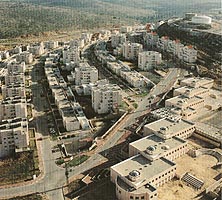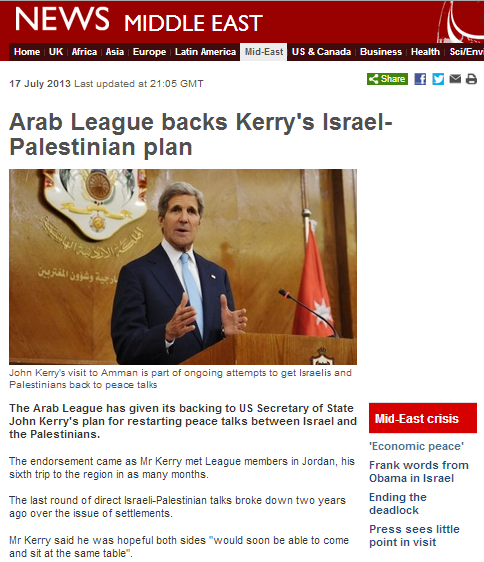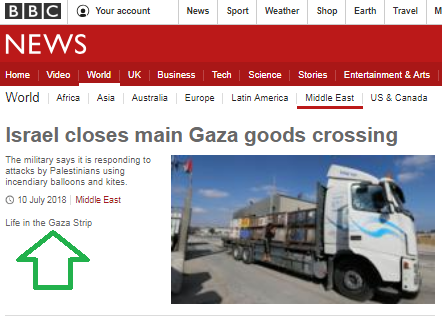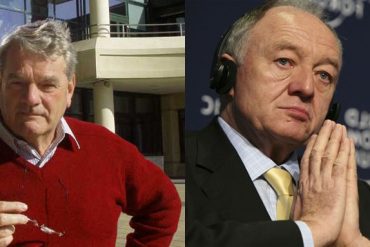On July 17th 2013 the BBC News website’s Middle East page featured an article entitled “Arab League backs Kerry’s Israel-Palestinian plan“.
By the article’s third paragraph the BBC is once again misleading readers on the subject of the Palestinian Authority’s refusal to continue negotiations in September 2010 by inserting its usual euphemistic pro-forma sentence which is no longer even correct time-wise.
“The last round of direct Israeli-Palestinian talks broke down two years ago over the issue of settlements.”
As we have unfortunately had to point out here many times before:
“The statement fails to inform readers that prior to that break-down in talks, a ten-month freeze on construction had been implemented by Israel in order to encourage the renewal of discussions, but the Palestinian Authority failed to come to the negotiating table for nine of those ten months and then used the end of the construction freeze on September 26th 2010 as a pretext to refuse to continue talks.”
In the latter part of the article the BBC yet again promotes its highly selective narrative on the subject of ‘obstacles to peace’:
“The issue of Jewish settlements in the West Bank remains one of the biggest stumbling blocks between the two sides.”
It also promotes an egregiously partisan distortion of Israeli planning processes which clearly breaches BBC guidelines on both accuracy and impartiality: 
“Israel gave its final approval on Wednesday for the construction of more than 700 new settlement homes in Modiin Ilit, halfway between Jerusalem and Tel Aviv.
One of the Palestinians involved in negotiations with Mr Kerry, Mohammed Ishtayeh, said the approval had been timed to obstruct Mr Kerry’s efforts.
“It has become a trend to see such Israeli behaviour each time an American or an international official visits the region to push forward the negotiation track,” Mr Shtayyeh said.”
In fact, as reported in Ha’aretz, the approval of 732 housing units in Modi’in Ilit (located in one of the large blocs which will, under any realistic scenario, remain under Israeli control after final status negotiations on the subject of borders) was given at a pre-scheduled meeting at which the discussion of additional planning applications in Shilo, Kochav Ya’akov, Kibbutz Almog (near the Dead Sea) and Kibbutz Gilgal (in the Jordan Rift Valley) was also supposed to take place.
“עם הגעת חברי הוועדה לדיון, התברר כי בלילה החליט שר הביטחון לדחות את הדיון בכל הנוגע לשילה, כוכב יעקב, אלמוג וגלגל. שר הביטחון לא נימק את החלטתו, אך חבר בוועדה העריך כי הסיבה היא ביקורו של שר החוץ האמריקאי, ג’ון קרי, באזור…”
“With the arrival of the committee members at the meeting it became known that during the night the Minister of Defence had decided to postpone the discussion in relation to Shilo, Kochav Ya’akov, Almog and Gilgal. The Minister of Defence did not explain his decision, but a member of the committee estimated that the reason is the visit by the American Secretary of State, John Kerry, to the region…”
One section of the BBC article is devoted to the subject of the 2002 Arab League initiative:
“He [Kerry] also urged Israel to “look hard” at a Saudi-backed peace initiative first proposed in 2002. The plan would offer full recognition of Israel, but only if it returned all land seized in the 1967 war, as well as agreeing to a solution for Palestinian refugees.
Mr Kerry said that it gave Israel the promise of peace with the Arab world.”
However, the article does not link to the text of that initiative (despite the fact that it exists on the BBC website) or give audiences any explanation of the issues surrounding it which would clarify for them the banality of Kerry’s reported statement and explain the next sentence in the article:
“Israel has said it could not accept the terms as originally proposed but has indicated a readiness to consider the idea of the plan.”
On the same day that the Arab League (composed mainly of the very same countries which sought to annihilate Israel in 1948 and again in 1967) declared its ‘peace initiative’ in Beirut – March 27th 2002 – Hamas carried out the suicide bombing in the Park Hotel in Netanya in which 30 Israelis were killed and 140 injured. Hamas has consistently rejected the Arab League proposal since its inception and in its subsequent forms – most recently in May 2013. Hizballah and the Palestinian Islamic Jihad also reject any plan which would lead to the recognition of Israel, territorial compromise and an end to the Arab-Israeli conflict.
Quite how Kerry or anyone else expects Israel to respond to a ‘one stop shop’ proposal which is rejected by three of the main terrorist organisations in the region (funded by Iran, which is of course not a member of the Arab League) is unclear. No less problematic is the fact that despite the fine rhetoric, the Arab League plan – conceived in the days when Arab dictators were rather more thick on the ground than they are today – cannot provide any guarantee of clause 3 of the initiative in today’s changing Middle East:
“3. Consequently, the Arab countries affirm the following:
I- Consider the Arab-Israeli conflict ended, and enter into a peace agreement with Israel, and provide security for all the states of the region.
II- Establish normal relations with Israel in the context of this comprehensive peace.”
With the future government of Egypt an uncertainty and Syria suspended from the Arab League since November 2011, the notion that ‘land for peace’ can be guaranteed – particularly in the Golan Heights – is patently dubious at this time.
Aspects of the plan which have been problematic since its beginning include the stipulation of Israeli withdrawal to lines which are not the 1949 Armistice lines and the fact that it negates UN SC resolution 242 by use of the phrase “all the territories”.
“Full Israeli withdrawal from all the territories occupied since 1967, including the Syrian Golan Heights, to the June 4, 1967 lines as well as the remaining occupied Lebanese territories in the south of Lebanon.”
That demand is particularly problematic in relation to the Sea of Galilee and the Golan Heights where the June 4th 1967 lines do not  correspond with previous international borders or the 1949 Armistice lines. It also ignores the fact that Israel’s withdrawal from southern Lebanon in May 2000 is considered by the UN to be a withdrawal to the international border and of course it promotes the anachronistic – and highly problematic – division of Jerusalem.
correspond with previous international borders or the 1949 Armistice lines. It also ignores the fact that Israel’s withdrawal from southern Lebanon in May 2000 is considered by the UN to be a withdrawal to the international border and of course it promotes the anachronistic – and highly problematic – division of Jerusalem.
Another particularly difficult issue is that of Palestinian refugees, with the Arab League initiative calling for their ‘right of return’ to Israel:
“Achievement of a just solution to the Palestinian refugee problem to be agreed upon in accordance with U.N. General Assembly Resolution 194.”
The same document also declares that the Arab League:
“Assures the rejection of all forms of Palestinian patriation which conflict with the special circumstances of the Arab host countries.”
That clause is interpreted by many observers as being especially problematic as it provides Arab countries with the legitimacy to refuse naturalisation to Palestinian refugees already living there for generations and potentially inflates the numbers exercising the previously promoted ‘right of return’.
In addition, the Arab League initiative (to which, of course, Israel had no input, making it a dictate rather than the outcome of negotiations – as the Quartet has always claimed to envisage the end to the conflict coming about) makes no mention of the Jewish refugees from Arab lands and no provision for their compensation.
Obviously, the BBC’s dumbed-down presentation of the Arab League initiative as a panacea to the problems of the Middle East actively prevents its audiences from understanding the issues at hand and flies in the face of its commitment to “enable individuals to participate in the global debate on significant international issues” and “enhance UK audiences’ awareness and understanding of international issues”.
Coupled with the promotion of blatant lies about Israeli planning processes which clearly breach BBC editorial guidelines on accuracy and impartiality, that makes this article a prime example of BBC campaigning rather than the objective journalism to which licence fee payers are entitled.





